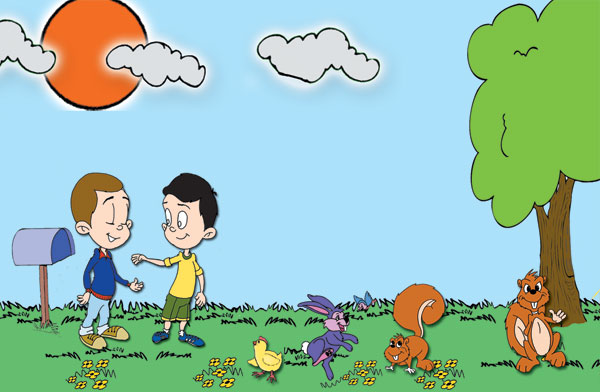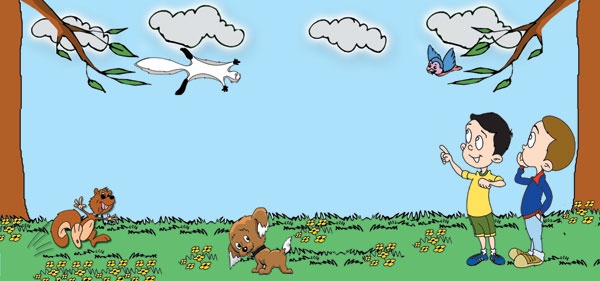Bilal and Dawud were two friends who got along very well together. They had just read a book about the lives of animals and had enjoyed it very much. How exciting it would be to get to know these animals better! That evening they talked to their families and persuaded them to take a trip to the country at the week-end. On the way, they asked each other questions about the animals they were going to see there. As soon as they got out of the car, they started to run around among the trees. Their families sat on benches and started talking. Bilal and Dawud asked for permission to wander around as they were anxious to see some animals.

After walking a little distance they sensed a movement in the leaves.
"Dawud, look there!" said Bilal. "I think it's a squirrel!"
"Come on!" said Dawud, "Let's have a closer look."
It was indeed a squirrel, who said: "You seem like two very curious boys. I can tell you what you want to know."
"Yes, please. Tell us," said Dawud.
"I was wondering why you have such a long tail," said Bilal.
"First of all," the squirrel began: "I can go in many directions up in the trees. For example, with my sharp claws I can climb trees very easily. I can run along branches, swing upside-down and even walk that way. My relatives and I are called 'grey squirrels' and we can easily jump from the top of one tree to another 15 feet (4 meters) away. We jump into the air as if we were flying; we then open our arms and legs and glide in the air. We flatten our tails for balance and use them as a rudder for direction."
 |
Dawud said: "I read in a book that some squirrels can fly. Do flying squirrels only need long tails to fly?"
"Yes," answered the squirrel. "In Australia there are some kinds of squirrels that can fly. They are between 20 and 35 inches (45 and 90 cm) long. They move from one tree to another with long jumps. Instead of wings, they have a gliding membrane and they move among the trees like gliders. For example, the flying membrane of sugar gliders stretches from their front legs right up to their back legs. A flying squirrel can jump from the trunk of one tree and, with his skin tightened and looking like a glider, he can travel about 100 feet (30 meters) in a single leap. At times, they have even been observed traveling a distance of 1740 feet (530 meters) in six glides, one after another."
"How do they figure out the distances when they jump between trees so far apart?" Bilal wondered. "In order to land on the right spot they must have to make calculations. Just a little mistake and they would fall to the ground."
The squirrel agreed: "Very true. When we jump, we aim for thin branches and we have to jump carefully in order to land in just the right place. To do this we use our back legs, our sharp eyes, which are very good at guessing distances, our strong claws and our tails, which help us keep our balance. And the One Who has given us these abilities and taught us how to use them is our Almighty Lord. Otherwise, it would certainly not be possible for us to get hold of a ruler and measure the height of the trees and the distances between the branches."
 |
Dawud asked, "Do you have other uses for your tails?"
Bilal added: "I saw a documentary once. Small animals lose heat from their bodies when they don't move. In cold weather they are in danger of freezing, especially when they are asleep. But, as with all kinds of animals, Allah has created a way for squirrels to protect themselves in difficult outside conditions. Squirrels have thick fur tails which they wrap around themselves, and they sleep curled up like a ball. This thick tail is like a winter coat which protects them from freezing when they sleep in cold weather."
"Yes, it's true," agreed the squirrel. "In cold weather our tails keep us warm. But there is also another use for our tails. As with other animals, we squirrels also have various ways of communicating among ourselves. Take red squirrels for example. When they see an enemy, they shake their tails and make excited sounds."
Dawud pointed: "Look at how many nuts you have gathered. You must be very hungry."
The squirrel went on: "It's difficult for us to find food in winter, so, we prepare for winter by collecting food in the summer. We have to be very careful when we store our food. We can't store fruit because it soon goes bad. In order not to go hungry in winter, we must only collect nuts, pine cones and other such foods that will last. See? I will store these nuts away to eat in the winter."
Dawud added: "It is Allah Who teaches all creatures how to find and store their food; it is He Who gives its daily food to every creature He has created. One of the attributes of Allah is 'the Provider' because He gives food to every living thing He has created. We are told in the Qur'an how merciful and compassionate Allah is: 'How many creatures do not carry their provision with them! Allah provides for them and He will for you. He is the All-Hearing, the All-Knowing.' (Surat al-'Ankabut: 60)"
 |
The squirrel then said: "Allah has given every creature He has created qualities to help it adapt to the environment it lives in. It is not enough for us to find food and store it; when winter comes, we also have to find the place where we have stored it. We can do this because of the wonderful sense of smell our Lord has given us. We can even smell nuts covered with 12 inches (30 cm) of snow.
We store the food we collect in more than one place. But later we forget where we have put it. Yet Allah makes us forget for a definite purpose. In time, the food we have stored under the ground in the forest will sprout and new trees will grow."
Bilal had been thinking: "Nuts and chestnuts have very hard shells. We use nutcrackers to open them. How can you squirrels break them open without a nutcracker?"
"We have teeth that are sharper and stronger than the teeth of any human being," explained the squirrel. "Our front teeth, called incisors, allow us to break hard materials; in the space behind these are our molar teeth. By means of these sharp teeth of ours, we can break the shell of any nut, no matter how hard it is."
"Does that damage your teeth?" wondered Dawud.
The squirrel explained: "Here, too, you can see the perfect harmony that exists between everything in the supreme creative artistry of our Lord. If our teeth break off or wear out, new ones grow back. Allah has given this ability to all creatures like us that have to gnaw their food."
Bilal added: "We are told in the Qur'an about the beauty and perfection of the living things Allah has created: 'And in your creation and all the creatures He has spread about there are Signs for people with certainty.' (Surat al-Jathiyya: 4)"
Dawud agreed: "We must remember that Allah is in control of everything at every moment. We should thank Him for every blessing He has given us, pray that we may be His beloved servants and ask for His forgiveness."
"Yes, you're right," said Bilal. "It's getting late, Dawud. Let's go back now. Thanks for what you told us, little squirrel."
"Bye, bye, my little friends," said the squirrel.